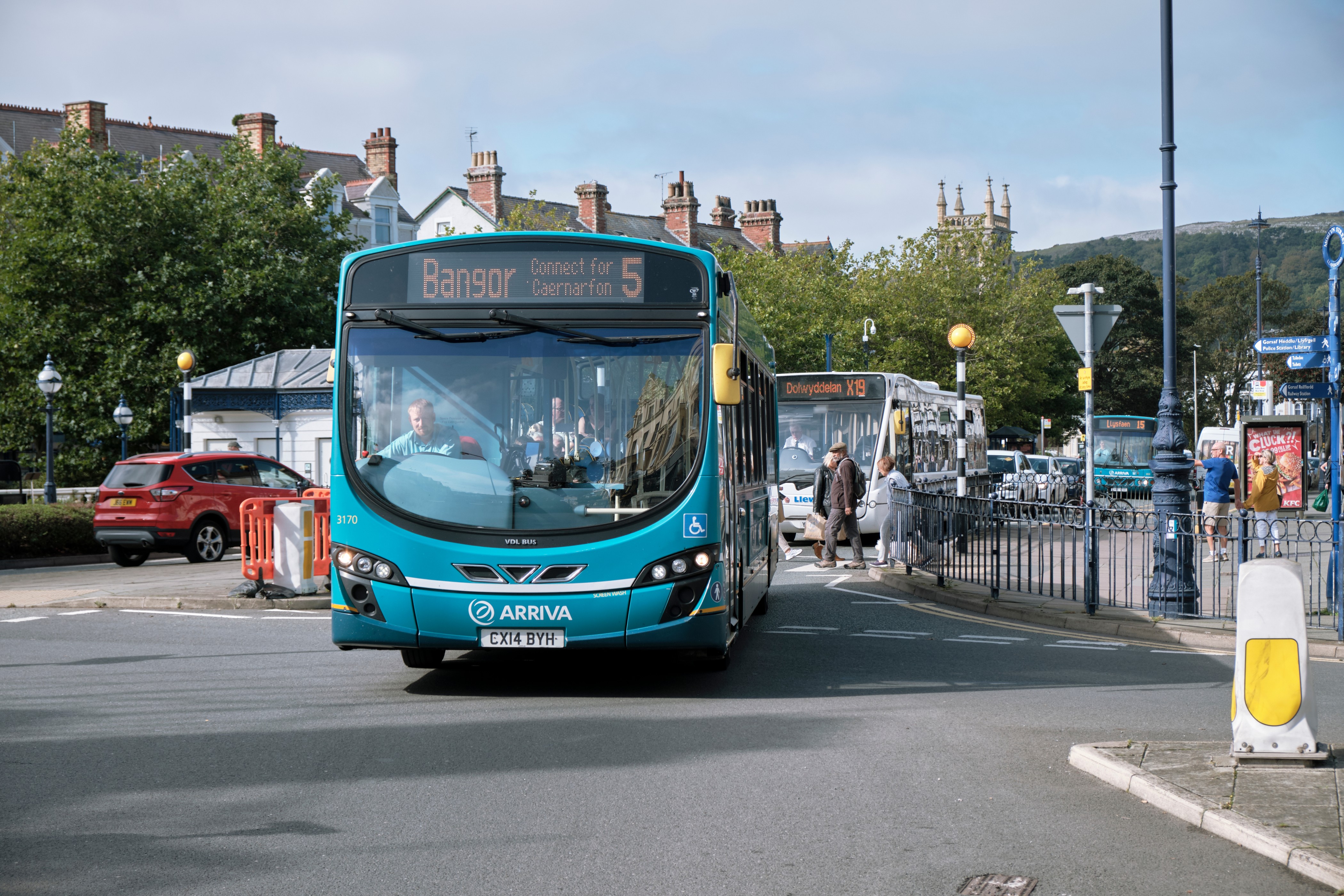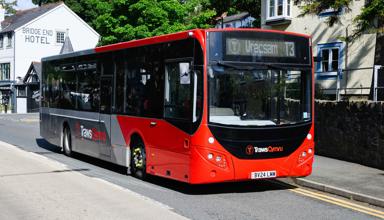The Future of Road Investment in Wales - the final report of the Welsh Government’s roads review panel – was published on Valentine’s Day, 14 February.
When the review was announced in June 2021, attention focused on the future of the schemes included in the review.
But it goes much much further, heralding a fundamental change in approach to Welsh Government highway investment.
It’s met disappointment in some quarters, and joy in others. However, with funding for bus services under threat the Welsh Government will need to be sure it can deliver the new approach.
Why was the review commissioned?
There have been significant policy changes since many schemes were conceived. The report says its rationale is to examine the current project pipeline, assessing whether it aligns to these policies, and to make recommendations on future policy approaches.
The Welsh Government declared a climate emergency in 2019 and set targets to achieve net zero emissions by 2050.
Despite being the third largest Welsh emissions source, the Committee on Climate Change (CCC) describes surface transport emissions as “virtually flat” since 1990.
The “new path” in Llwybr Newydd: the Wales transport strategy (2021), focuses on reducing the need for travel and supporting sustainable travel. Both the strategy and updated land-use planning policy seek to embed the “sustainable transport hierarchy”.
 The strategy and Welsh Net Zero Plan aim to reduce passenger transport emissions by 22% between 2019 and 2025, and 98% by 2050. Car miles are to reduce by 10% by 2030, and modal share for active travel and public transport to increase to 39% by 2030, and 45% by 2040.
The strategy and Welsh Net Zero Plan aim to reduce passenger transport emissions by 22% between 2019 and 2025, and 98% by 2050. Car miles are to reduce by 10% by 2030, and modal share for active travel and public transport to increase to 39% by 2030, and 45% by 2040.
The scale of action required is huge. In October 2022 the Senedd’s Climate Change Environment and Infrastructure (CCEI) Committee found the modal shift targets are “not underpinned by the tools to ensure they can be delivered”.
The recent Confederation of Passenger Transport and WPI Economics report, Bus and Coach: the route to net zero in Wales, concluded “the current policy trajectory” would deliver “just over one fifth” of the modal shift to bus needed for net zero.
The Deputy Minister for Climate Change, Lee Waters, has said the Welsh Government “has struggled” to integrate transport with trip generating policies like land-use planning. He’s also acknowledged weaknesses in how Welsh Transport Appraisal Guidance is applied, commenting “time after time, in practice, the results WelTAG churns out are the results it's always churned out”.
What did the panel conclude?
The report made two headline recommendations establishing a “’4x4’ of purposes and conditions for future road investment”. This will be limited to four “purposes”:
- supporting modal shift;
- reducing casualties through small changes;
- climate change adaptation; and
- supporting prosperity through access to development sites which support sustainable transport.
It also set “conditions” that schemes should:
- minimise carbon emissions from construction;
- not increase vehicle speeds that increase emissions;
- not increase road capacity for cars; and
- not adversely affect ecologically valuable site.
The new purposes don’t affect maintenance and renewal spending, and these “first stage filters” don’t replace systematic appraisal.
The report makes 51 recommendations in total, including calls for regional multi-modal investment programmes and a trunk road modal shift programme. It proposes trunk road safer speeds and routes programmes, creation of “exemplar” economic / residential developments and greater attention on freight.
Of the schemes themselves, 17 were considered consistent with the 4x4 criteria. For a further 17 the panel found a different approach or alternative solution preferrable. The panel found no case for the remaining 14.
How has the Welsh Government responded?
In his plenary statement the Deputy Minister hailed “a landmark report of international significance”. He highlighted issues identified in the report, including induced demand and embodied carbon in infrastructure schemes, saying:
… we have accepted the report’s case for change. We will not get to net zero unless we stop doing the same thing over and over.
The detail of the response is set out in a new Roads Policy Statement and new National Transport Delivery Plan (NTDP) published with the review report.
The policy statement sets four road building tests reflecting the purposes set by the panel, with minor tweaks tying in policy issues like Freeports. The four conditions are also reflected. The Deputy Minister made clear that this policy “will be a material consideration in the event of any planning dispute”.
The approach to the schemes themselves is set out in the NTDP, along with a summary document.
The NTDP plans don’t exactly reflect the panel recommendations on schemes. For example, the recommendation that the third Menai Crossing shouldn’t proceed becomes a referral to the North Wales Transport Commission to develop options for resilience on the Menai strait. Also, while the Flintshire Corridor Improvement programme has been cancelled, the NTDP commits to develop options to improve air quality at the A494 Aston Hill.
A small sample of development land schemes which the panel didn’t make recommendations on will receive further consideration.
Hero or Zero?
Unsurprisingly, the response is mixed.
The Deputy Minister received challenge from all parties, in response to his plenary statement – including his former Ministerial boss, Ken Skates MS.
Support – sometimes qualified – also came from many parts of the chamber.
Criticism is understandable. Long anticipated schemes have been cancelled or sent back for review. Local politicians, businesses and communities who saw investment as the solution to local challenges won’t be easily convinced.
Others like the Office of the Future Generations Commissioner for Wales and the environment sector strongly welcome the approach.
However, few could disagree with the CBI’s response that “having rejected or revised dozens of transport projects across Wales, the ball is now in the government’s court to produce an alternative solution with urgency”.
The logic of the new approach requires investment in solutions meeting the 4x4 criteria. But the budget challenges highlighted in the Deputy Minister’s statement continue.
The recent Welsh Government draft budget included £28m for the Covid Bus Emergency Scheme in 2023-24 – matching the 2022-23 allocation. The optics of publishing a statement suggesting this is in jeopardy four days before a report mandating greater action on modal shift are tricky.
Equally, embedding the new approach will be culturally and organisationally challenging. The regional Corporate Joint Committees which would surely be involved in developing regional programmes are in their infancy. While the panel recommended a regional coordination role for Transport for Wales (TfW) this would come on top of a growing list of responsibilities for the organisation stretching its capacity to the limit.
The political challenge around reducing car use is daunting. On top of difficult past decisions on the M4 and default 20mph speed limits there will be more to come. As the Senedd’s CCEI Committee has heard, the scale of the modal shift and climate challenge will require stronger action on behaviour change.
NTDP commitments on “a strategy for fair road user charging” can expect a hot reception.
The Deputy Minister has shown he’s well aware of the scale of the challenge. Despite the national and international attention for this decision, he can be in no doubt that he will have many more challenging questions to face closer to home.
Article by Andrew Minnis, Senedd Research, Welsh Parliament






